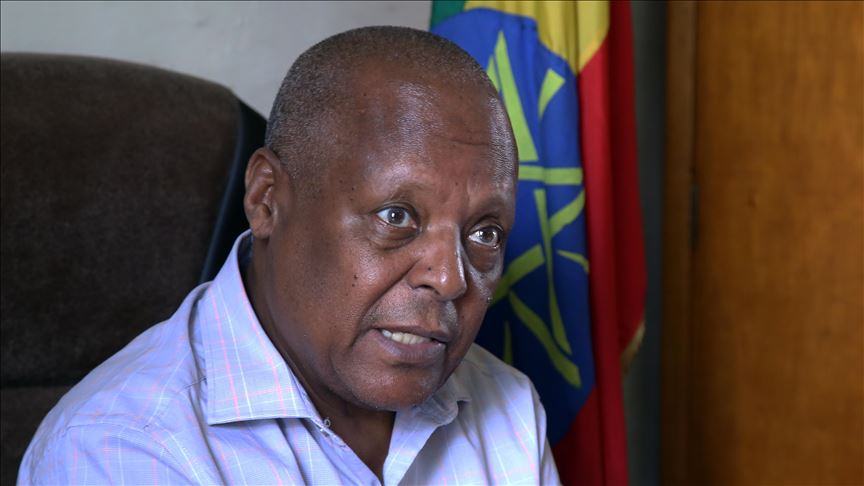 Merera Gudina, Ethiopian political scientist
Merera Gudina, Ethiopian political scientist
ADDIS ABABA, Ethiopia
As Ethiopia gears up to a much-anticipated sixth round of parliamentary elections, uncertainty prevails about the future of this ethnically-diverse nation of more than 100 million.
"The country still stands at the crossroads in spite of latest political developments," Merera Gudina, opposition politician and political scientist, told Anadolu Agency, referring to changes since the rise of reformist President Abiy Ahmed in April last year.
"But there are still tensions everywhere -- political tensions, social tensions, economic tensions," Merera said, adding that the government's main challenge was surmounting the country's many problems and delivering on its promises of a democratic and prosperous Ethiopia.
Merera, who is the chairman of prominent party coalition MEDREK -- a coalition of three parties including his own Oromo Federalist Congress -- sees Abiy's administration as being a modified extension of the pre-April 2018 government.
Before the recent period of reforms, Ethiopia was ruled under an iron fist for 28 years essentially under the Tigray People's Liberation Front (TPLF) which dominated the four-party coalition of the Ethiopian People's Revolutionary Democratic Front (EPRDF).
The TPLF-led government had been accused of bad governance, oligarchy, nepotism, economic injustices and severe human rights violations for which the government of Abiy apologized from the outset of his taking office. Taking the helm of the EPRDF, Abiy has since tried to curb the TPLF’s clout.
Merger
Just last week, the ruling coalition announced a historic merger among the four constitutive parties in the EPRDF that led to the founding of the Prosperity Party (PP), with opinions over the move divided.
For Merera, the move was basically a tactic to "win the upcoming election in the face of fierce political competition brewing."
The election slated for May 2020 is going to be a fierce political battle between numerous parties with wide support bases including Medrek, the Ethiopian Citizens for Social Justice, the Oromo Liberation Front and a long list of others.
"Winning is not going to be easy for the ruling party this time around," says Merera, who had been imprisoned for years under the pre-reform administration. "The government should live up to its promises of delivering a fair competition, credible election."
The merger, though conceived more than a decade ago, was only recently realized as the PP in November. It brought together three of the four parties within the ruling EPRDF coalition -- the Oromo Democratic Party, Amhara Democratic Party and South Ethiopia Peoples' Democratic Organization -- as well as a tuft of other minor parties.
Dissolving themselves as separate political entities in order to join the PP, these parties had been long pushing such a merger, saying the coalition sidelined them from participating in federal-level politics.
"The merger apparently would have two nationally significant outcomes in a short-term. First, a hard blow to the ethnic-based political formation that many political scientists see as being fundamentally flawed to pursue in such a diverse nation of more than 110 million people," one political analyst told Anadolu Agency, asking to remain anonymous.
"Secondly, it ended the hegemony of the Tigray People's Liberation Front that led the coalition as a mover and shaker since 1995 that they had been formed constitutionally as a ruling coalition. The TPLF, a party that had been a proponent of the merger, suddenly came out as ardent opponents," he said.
He said: "The merger abolished the ruling coalition, The Ethiopian People’s Revolutionary Front (EPRDF) that ruled the country for nearly three decades in a system of governance that emphasized disaggregation of interests under an ethnic and linguistic based federalism."
"What has been created in effect was a system of governance in which TPLF people took full control of the country’s civil service, economic infrastructures and the military in addition to huge business operations under the guise of endowment," he added.
All these changes came about after April 2018, when Abiy emerged from incessant anti-government demonstrations by youths that lasted three years in the Oromia and Amhara states -- the country's two largest and most populous regions.Elections
The political spectrum seems divided between those calling for rapid elections and those who argue that polls should be postponed as the country is not yet prepared.
The second group points to the country's security situation, marked by spontaneous ethnic clashes, which has recently become a daily phenomenon in universities across the nation.
"I understand the situation is dilemmatic and both sides have their reasons; but as to me it would be better to conduct on or near the regular date in order to prevent what may come as a mayhem if pushed to another time," Professor Merera said.
Nathnael Feleke, public relations chief for Ethiopian Citizens for Social Justice, told Anadolu Agency that his party was for democratic elections, but that it would be better to delay elections with the absence of calm and security in the country.
Communication advisor to the National Electoral Board of Ethiopia (NEBE) Solyana Shimelis says the Election Board is doing its best to conduct polls on time.
"There is a lot to do, including introducing a revised legal and ethical document for rule of electoral engagement, deployment of electoral work force and a lot more," she told Anadolu Agency, adding: "Time is against us."
There are currently nearly 170 political parties registered to vie in coming general elections.
Anadolu Agency website contains only a portion of the news stories offered to subscribers in the AA News Broadcasting System (HAS), and in summarized form. Please contact us for subscription options.





